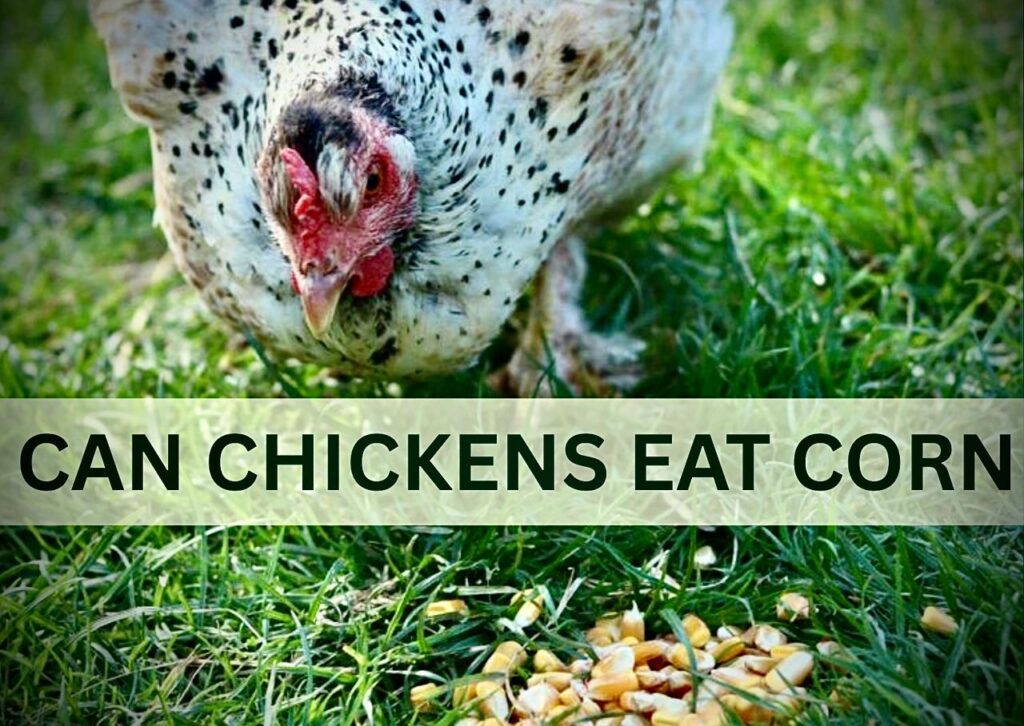If you have a few flocks of chickens at home, you may be curious about what they can and cannot eat. A common question that arises is, “Can chickens eat corn?” You are not alone in asking this. Many chicken owners want to provide the best nutrition for their birds while also treating them to tasty snacks.
The simple answer is yes, chickens can eat corn! Corn can be a great addition to their diet, but it’s important to know how much and in what forms to feed it. Corn is mostly a carbohydrate, which means it can help keep your chickens full, but we need to ensure they also get other essential nutrients to keep them healthy and strong.
We are excited to explore this topic together, and we will cover everything you need to know about feeding corn to chickens! From the right amounts to the best ways to serve it, we will make sure you have all the information handy for your lovely birds.
Here’s what we will look at in this article:
- Can Chickens Eat Corn?
- How Much Corn Can Chickens Eat?
- Best Way to Feed Corn to Chickens
- Benefits of Feeding Corn to Chickens
- Risks and Dangers of Feeding Too Much Corn
- Substitutes for Corn in Chicken Feed
Let’s start our journey!
Can Chickens Eat Corn?

Yes, chickens can safely eat corn! They love it, and it can be a delightful treat for them. To understand why this food is a favorite among many chicken keepers, we need to look at its nutritional profile and how it fits into a chicken’s overall diet.
Corn can be offered in different forms, including whole kernels, cracked corn, or cornmeal. It all depends on your chickens’ preferences and what is available to you. Chickens are natural foragers and enjoy scratching around in the dirt for grains and seeds, and corn mimics that natural behavior.
Feeding your chickens corn can be a great bonding experience. Watching them eat, cluck happily, and interact with each other adds character to their daily lives and makes you appreciate their unique personalities even more. However, while corn can be beneficial, it should never be the sole part of their diet. Chickens need a balanced diet that includes proteins, vitamins, and minerals.
How Much Corn Can Chickens Eat?
When it comes to how much corn chickens can eat, moderation is key. Corn should not be more than ten percent of their daily diet to maintain the balance required for their health. This is because chickens require a variety of nutrients to keep them healthy, and corn lacks some of these essential components.
The quantity of corn we give our chickens may vary depending on their age and overall diet. For example, younger chickens, or pullets, might require different amounts compared to adult hens. We need to observe how they respond to this treat. Signs of over-indulgence may include decreased egg production or changes in behavior.
If we notice our chickens getting too reliant on corn, it may be helpful to measure out a serving or offering a limited amount a few times a week rather than daily. Chickens are great learners, and the more we manage their feed, the better their nutrition habits will align with what we desire for optimal health.
It is also essential to introduce corn gradually to them if they haven’t eaten this food before. Chickens can be sensitive to sudden changes in their diet. By providing small amounts of corn initially, we can help them adjust and avoid any potential digestive issues.
Another great tip is to monitor the weight of your chickens. If they are becoming overweight, we may need to reduce the amount of corn they receive. A healthy chicken will have a nice balanced body condition that allows them to move freely and engage happily in their environment.
Best Ways to Feed Corn to Chickens
The best way to feed corn to our chickens will depend on their preferences and our individual setups. One popular method is offering whole corn or cracked corn as a treat. We can simply scatter it on the ground, allowing them to forage for it as they would in their natural habitat. This style of feeding promotes their natural behaviors, which is beneficial for their mental health.
For those concerned about the waste from scatter feeding, another option is to use a feeder designed for grains. Many feeders are specifically made for small items like corn, allowing us to control how much they receive and reduce the chances of waste.
Offering corn mixed with other grains can add variety and excite our birds. Mixing corn with oats or wheat creates a special grain mix they will enjoy and seek after. Keep in mind that we should always check if the mix maintains the nutritional value our chickens need daily.
For a unique treat, we can serve cooked corn as well. Chickens can enjoy corn on the cob or even frozen corn! Be sure to cut the kernels off if we use the cob, as small pieces are easier for them to chew and digest. We might even consider steaming the corn instead of boiling it, as that can keep more nutrients intact while making it soft and tender for our chickens to enjoy.
Lastly, we can get creative and add corn to other meals for our chickens, too. Mixing it into homemade treats allows us to blend their love for corn with other nutritious ingredients. There are many recipes you can find online that inspire us to create new snacks for our flock.
Benefits of Feeding Corn to Chickens
Hydration
Corn has a high moisture content, helping with chickens’ hydration, especially in hot weather. Although we should always provide access to fresh water, the inclusion of corn can give them a bit of extra hydration that is welcomed during summertime.
Fiber
Corn contains some fiber, aiding digestion. A good amount of fiber is vital as it keeps the digestive system running smoothly. Fiber promotes gut health and can help prevent any digestive-related problems. Healthy intestines in our chickens contribute to better absorption of nutrients.
Vitamins and minerals
Corn has valuable vitamins and minerals that support overall growth and health. It contains several B vitamins, which are important for energy metabolism and are instrumental in producing quality eggs if we are raising hens for egg production. In addition, the trace minerals found in corn can help support our chickens’ immune systems.
Mental stimulation
When we scatter corn around or offer it in different ways, we provide mental stimulation for our chickens. This encourages them to engage in foraging behavior, scratching and exploring their environment. Enrichment activities are essential for their mental health and help to break the monotony of their daily routine.
Nutritional breakdown of corn
Corn is primarily composed of carbohydrates, which provides energy for our birds, supporting their daily activities. It also contains a degree of protein, essential for growth and maintaining a healthy body. While corn should not be the sole ingredient in their diet, its role as a source of energy and nutrients is valuable when included appropriately. A balanced diet helps chickens thrive and produce eggs effectively.
Dangers of Feeding Too Much Corn to Chickens
Although corn benefits chickens, it can also present risks if mismanaged. One risk is overfeeding, which can lead our chickens to become overweight. An overweight chicken can face various health issues that detract from its overall wellness, such as egg-laying problems or heart complications. Monitoring how much corn we offer becomes essential.
Another danger includes a poor balance in their diet. If we give our chickens too much corn, they may miss out on other important nutrients and vitamins they need to thrive. This can lead to deficiencies, which can cause health problems down the line. Always ensure we provide a well-rounded diet that complement corn and any other treats we share.
We must also be cautious of moldy corn. Feeding our chickens with spoiled or moldy corn can have negative effects on their health and can even lead to poisoning. It’s important to store our corn properly in a cool and dry place, away from moisture that could lead to spoilage.
Lastly, while whole corn and cracked corn are generally safe, it’s crucial to avoid feeding chickens corn mixed with additives or preservatives. We want to give them pure corn without extras that might not be healthy for them. Staying informed about the treats we choose ensures that we keep our chickens safe and happy.
Substitutes for Corn for Chickens
If we find ourselves needing to substitute corn in our chickens’ diets, several excellent alternatives are available. Grains such as oats or barley can be great alternatives and provide similar energy sources. Chickens can also enjoy other vegetables like peas, carrots, and leafy greens, which can be offered alongside or in place of corn.
Protein-rich foods such as lentils, chickpeas, or sunflower seeds can complement their diets and give them essential nutrients they require. When introducing these substitutes, we should do so gradually to ensure they adjust well and remain comfortable with any new additions to their meals.
Additionally, scratch grains or chicken feed blends that contain corn can be utilized. These mixes offer a variety of grains, including corn, and help round out their nutrition while providing them with different flavors and textures. Finding a good quality feed is key to giving our flock the best nutrition.
Ultimately, it’s beneficial to offer a variety of foods to our chickens. By switching things up and allowing them to enjoy a wide array of snacks and meals, we can create a balanced diet where they receive all the essential nutrients necessary to thrive.
Frequently Asked Questions
How often should chickens eat corn?
Corn can be fed a few times a week in moderation, taking care not to exceed ten percent of their total diet.
Can baby chicks eat corn?
Baby chicks should not have corn until they are older, as it can be too hard for them to digest.
Is popped corn okay for chickens?
Popped corn is safe for chickens in small amounts, provided there are no added salt or butter.
Can chickens eat corn cobs?
Yes, chickens can peck at corn cobs, and it can be a source of fun for them!
What type of corn is best for chickens?
Whole corn or cracked corn is best for chickens. Avoid processed corn products with additives.
Final Thoughts
In conclusion, we see that corn can be a wonderful treat for our chickens when fed in moderation. It adds enjoyment and variety to their diet while providing some essential nutrients. Remaining mindful of how much we feed them and ensuring that we deliver a balanced diet will help our flock thrive.
We hope you found this information helpful in deciding how to treat your flock. If you’re interested in learning more about what other treats are good for our chickens, you can check out this article on Can Chickens Eat Grapes? There’s always so much more to explore when it comes to raising happy and healthy chickens!






